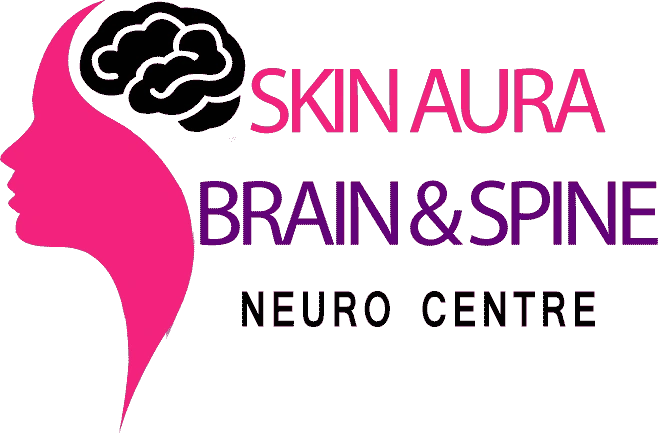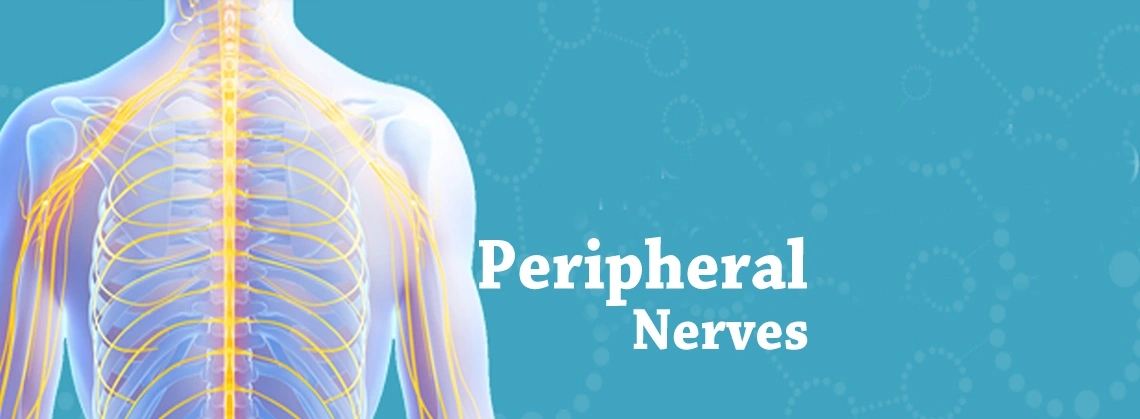Peripheral Nerves
The human body consists of a controlling unit called the nervous system. The nervous system is categorized into two parts; Central Nervous System (CNS) and the Peripheral Nervous System (PNS). The former includes the brain & the spinal cord. And, the later connects all the nerves running from the brain & spinal cord to the rest of the human body.
Peripheral Nervous System is a network of 43 pairs of the motor and sensory nerves that form a link between the brain and spinal cord and the entire body. The peripheral nervous system consists of 12 pairs of cranial nerves and 31 pairs of spinal nerves.
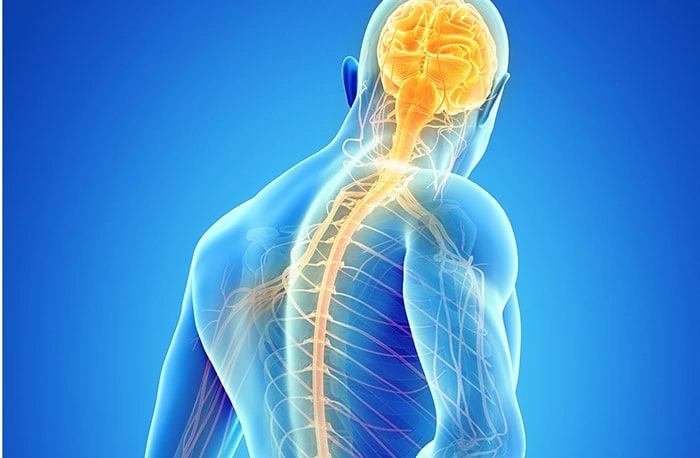
These nerves are delicate and fragile that makes it prone to damage. If damaged, the brain loses its ability to send and receive signals from the entire body. This breaks communication with body organs and muscles. This condition is known as Peripheral Neuropathy.
The nerves are made of a fibrous compound called “axons”. It is further surrounded by tissues that act as a shield. In case of injury, the fibers or the tissue gets damaged. Depending on the damage, peripheral nerve injury can range from mild to serious. If, the person may feel the loss of sensitivity at the site of damage.
How peripheral nerve injury caused?
The peripheral nerves can get damaged due to several causes. Putting pressure on the nerve or stretching the area can also lead to injury. Some health conditions and family history can also lead to nerve injury. Some of the major causes of peripheral nerve injury are as follows:-
- Injuries: Injuries due to several causes can lead to damage of nerves. This includes car accidents, electrical injury, gunshot injuries, fractures, physical trauma etc. Pressure on the wrist can cause damage to the median nerve. This is called carpal tunnel syndrome.
- Alcohols & chemicals: People who consume alcohol are prone to nerve injury due to the toxic effect it causes. Moreover, chemicals like solvents, glue or those present in insecticides can lead to damage of the nerves.
- Diseases: There are a few disorders that can eventually lead to injury of peripheral nerves. These include; diabetes, high blood pressure, kidney disorders, lack of thyroid hormone and chronic inflammation. Some vitamin deficiencies (Vit E, B1, B6 & B12) can also cause nerve injury.
- Infections & Virus: There are some harmful bacteria and viruses that directly attack the nerves. Chickenpox, HIV & AIDs virus can cause the damage. Arthritis and lupus can also affect the nerve tissue.
- Medications: Consumption of some medicines may also lead to nerve damage. These include drugs to cure seizures, cancer, fight bacterial infection and the drugs for controlling blood pressure.
Diagnosis
A peripheral nerve injury can be diagnosed by looking at the symptoms and medical history of the patient. The doctor may also perform a few tests to diagnose the condition. These tests include:
- Blood tests: This helps in determining the blood sugar level, thyroid deficiency or the deficiency of certain vitamins that can lead to peripheral Neurotherapy.
- CT & MRI: This is done to check if the nerve is pressed or for the presence of the tumor.
- Nerve Biopsy: This is a surgery to examine nerve tissue under a microscope to judge the presence of bacteria or virus. Nerve conduction studies(NCV)
Treatment
Treatment for peripheral nerve injury aims at curing the underlying cause. If a person is experiencing the disorder due to a medical disorder such as diabetes, the treatment is based on controlling the blood sugar level. Similarly, if the cause is a deficiency of some vitamin, diet & medicines rich in that particular vitamin is prescribed. The treatments for peripheral neurotherapy are as follows: -
Medication
Pain Killers: In case of mild pain, drugs such as acetaminophen (Tylenol) and nonsteroidal anti-inflammatory are helpful. These include medicines like aspirin and ibuprofen that acts as pain relievers. However, these drugs should be taken in moderate amounts, else can affect the functioning of stomach and liver.
Prescription medicines: Some prescription medicines can also help in curing the condition. These include; cyclooxygenase-2 inhibitors, tramadol, corticosteroid injections, drugs used for seizures, antidepressants.
Nonsurgical Treatments
In case of severe injuries, the doctor may perform medical treatments to stop the symptoms from exceeding. Some medical treatments are listed below:-
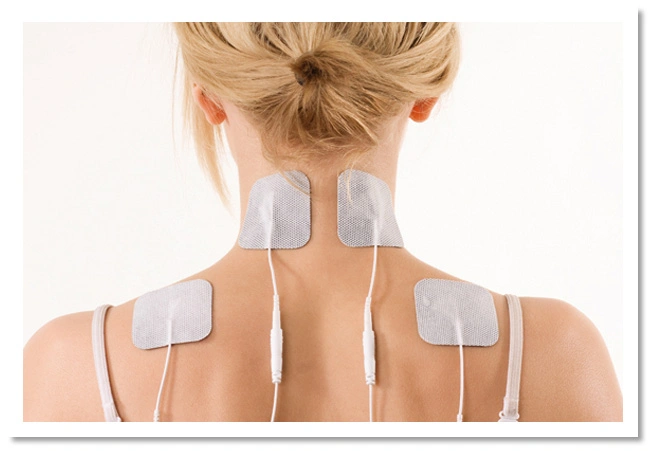
Transcutaneous Electronic Nerve Stimulation (TENS):- It is a drug-free therapy. During the procedure, small amounts of electric current are passed into the skin using electrodes. The process disrupts the nerves from passing pain signals to the brain.
Ergonomic casts: It the peripheral nerve injury affects hands, arms, legs or feet this technique is useful. The ergonomic casts provide support to the affected body part reducing the discomfort. This also relieves the patient from pain.
Some peripheral nerve operation also includes brachial plexus surgery, carpal tunnel surgery, muscle transfer, nerve graft, nerve entrapment surgery, nerve sheath tumor surgery, nerve transfer surgery, nerve transplant surgery, open decompression surgery, and sensory nerve surgery.
Brachial Plexus Injury & Repair
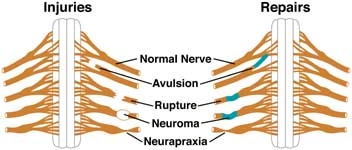
Brachial plexus is a network of nerves. These nerves are responsible for carrying signals from the spinal cord to hand, arms and shoulders. A brachial plexus may get injured due to stretching of the nerves or if they get ripped away from the spinal cord. This can lead to loss of function and chronic pain. The damage can be repaired with surgical procedures like Nerve Graft, Nerve Transfer & Muscle Transfer.
Carpal Tunnel Syndrome
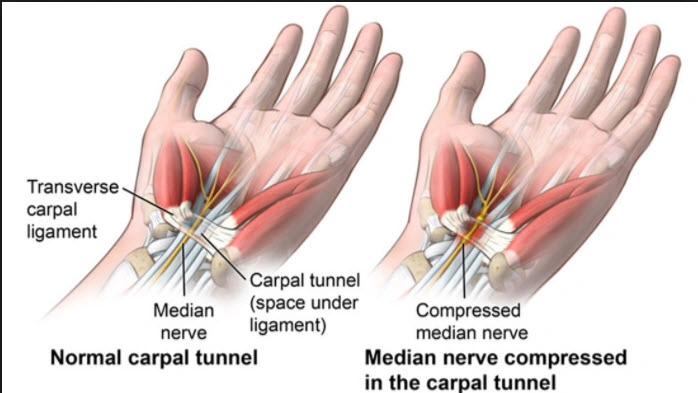
Carpal tunnel syndrome occurs when the cluster of nerve roots (the median nerve) passing through the narrow tunnel in the wrist gets injured or compressed. This causes a feeling of pain, numbness, and tingling in the hand. This is called carpal tunnel syndrome. It can be treated with non-surgical treatments such as; splinting, medications (NSAIDs), exercises or steroid injections. In severe cases “carpal tunnel release surgery” may be recommended.
Cubital Tunnel Syndrome
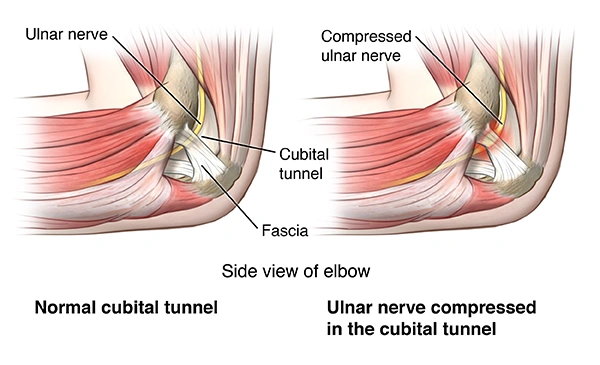
Cubital Tunnel Syndrome is a medical condition caused by stretching and pressure on the ulnar nerve that runs in a groove on the inner elbow. It results in a feeling of numbness or tingling in the ring fingers and pain or weakness in the hand. The foremost treatment is to avoid the cause of the symptom. A hand therapy can prove helpful. In severe pressure on the nerve, a surgery may be recommended.
